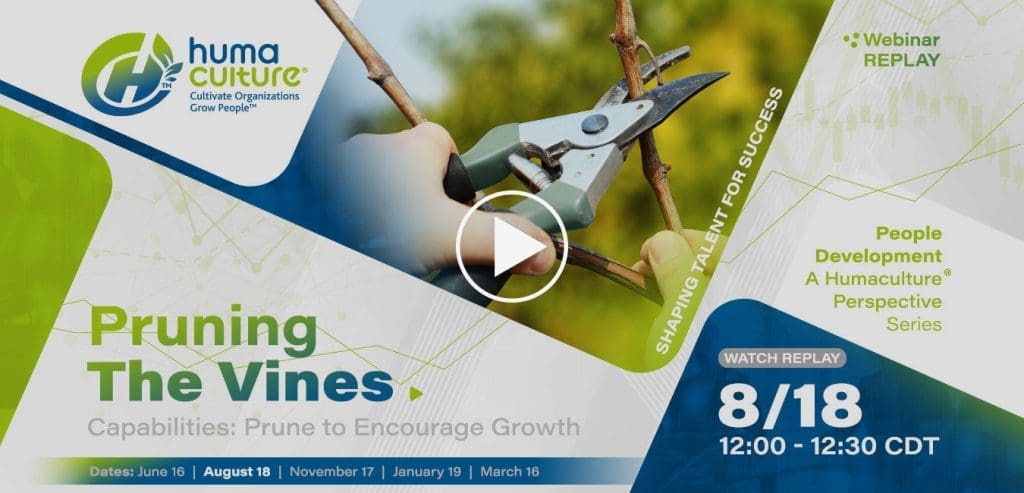Category: Organizational Development
Context of the Self: “The Complexity of Each Person”
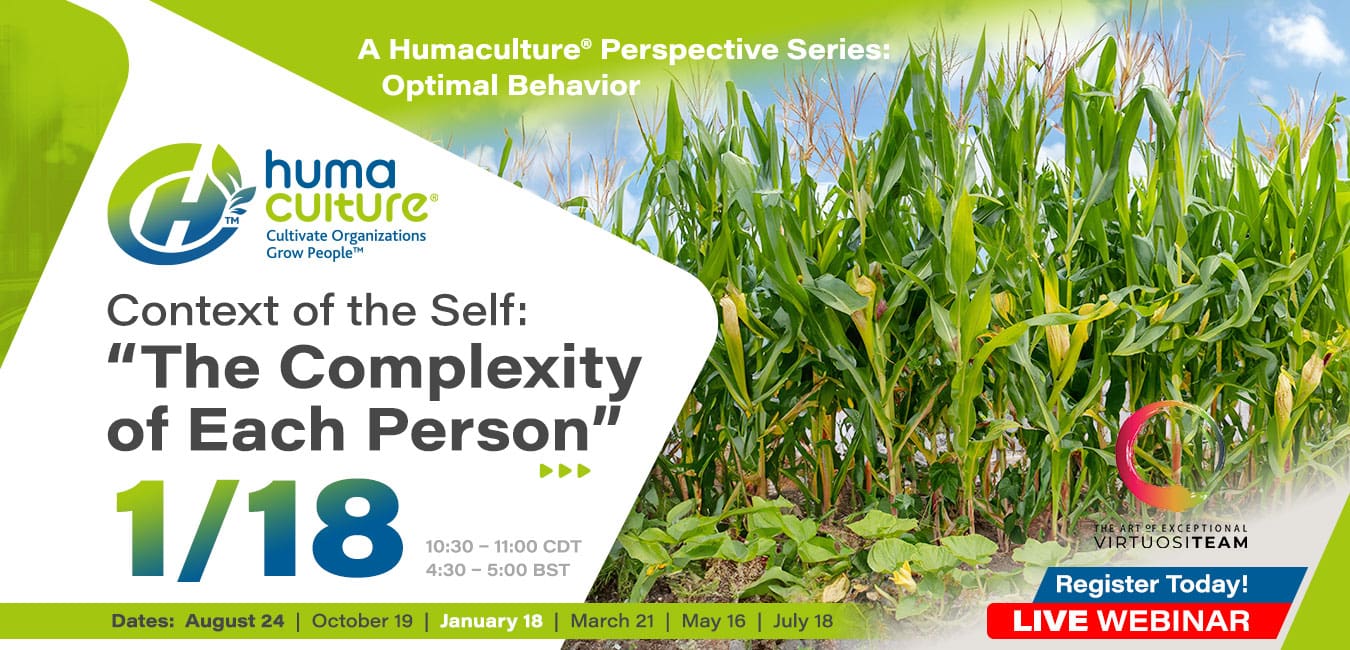
Join us on Thursday, January 18, 2024 from 10:30 to 11:00 CDT for the third webinar in Humaculture, Inc.’s “Optimal Behavior: Making Optimal Behavior the Natural Choice.” You will learn why the self can hamper performance and well-being and how to help People to grow capabilities, inspire motivation, overcome barriers, and resist temptations in order to lead to optimal behavior.
Presenters
- Steve Cyboran, ASA, MAAA, FCA, CEBS, actuary and strategy consultant
- Wes Rogers, Humaculturist® and strategy consultant
- Colin Bullen, ASA, behavior change actuary
- Hanlie van Wyk, behavior change consultant
Objective
In this third session in our series on optimal behavior, we explore how the Context of Self influences behavior. To be effective within the Organization, People need to know and manage themselves through their own narrative and understand the same for the People around them. Organizations fail to use narrative stories to connect People to the meaning of changes they are trying to make. Organizations shy away from giving People constructive feedback, yet People need feedback to Grow. Organizations fail to articulate the reason the Organization exists and how People connect with it. To inspire people to perform, Organizational purpose needs to be clear and create emotional attachment, driving motivation. Finally, Organizations associate fun as something that happens outside the workplace and having fun is regarded as unproductive. However, scientists have discovered that it takes approximately 400 repetitions to create a new synapse in the brain, unless it is done in play, in which case it only takes 10 to 20 repetitions.
“The measure of intelligence is the ability to change.” Albert Einstein
Context of Self to Promote Optimal Behavior Key Takeaways
Join us to learn:
- How ineffective organizations:
- Don’t understand how People change behavior
- Don’t Grow Capability and Confidence to change
- Don’t motivate and inspire change
- Don’t recognize how People inhibit sustained behavior change
- How effective organizations:
- Grow competence in change resilience
- Inspire and motivate
- Deploy change sustaining reinforcement tools
Available Support
We are available to support you in your strategy, design, compliance, financial, and monitoring needs. Our team includes business and human relations leaders, finance experts, actuaries, clinicians, behavioral health experts, pharmacy experts, and legal resources to guide you through the strategy and compliance process. Please contact us: [email protected].
Webinar Replay: Spaces Context: “Grow a Willow in a Desert? The importance of Spaces”
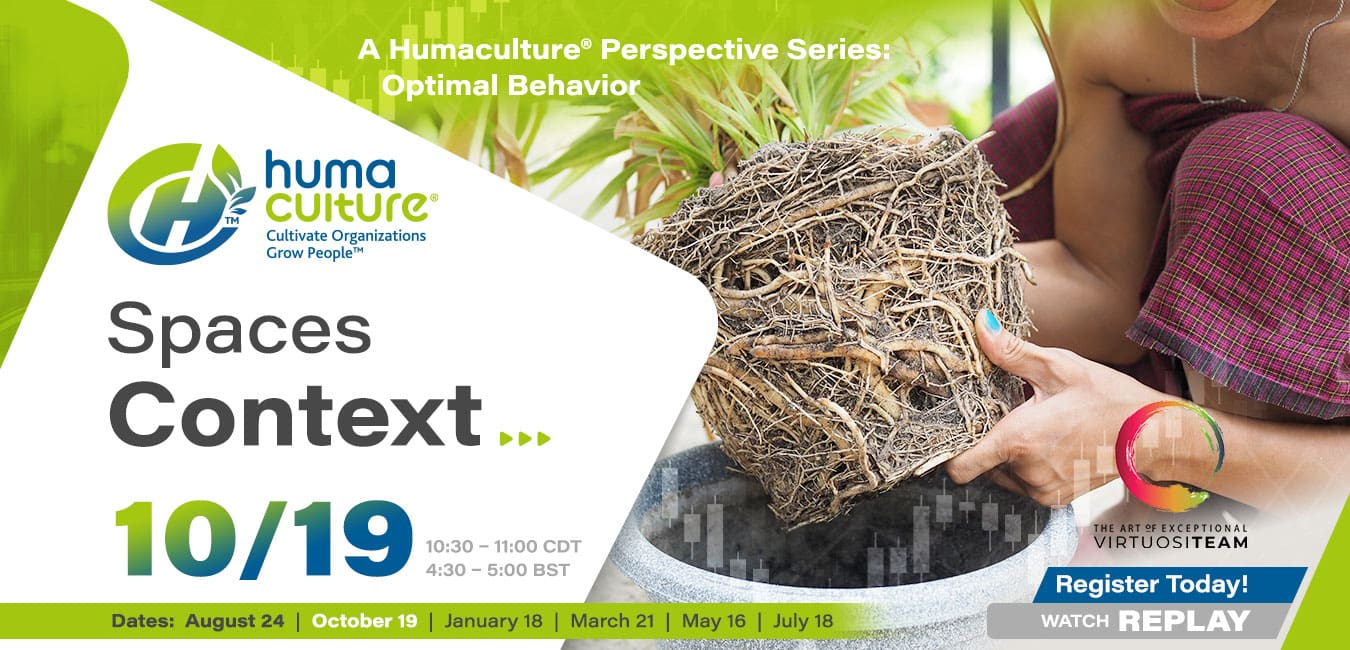
Watch a replay of the second webinar in Humaculture, Inc.’s “Optimal Behavior: Making Optimal Behavior the Natural Choice” to learn why spaces can hamper performance and well-being and how to design your spaces to lead to optimal behavior.
Presenters
- Steve Cyboran, ASA, MAAA, FCA, CEBS, actuary and strategy consultant
- Wes Rogers, Humaculturist® and strategy consultant
- Colin Bullen, ASA, behavior change actuary
- Hanlie van Wyk, behavior change consultant
Objective
In this second session in our series on optimal behavior, we explore how spaces influence behavior. The physical space in which you work can elicit mental and physical reactions that impact positively on performance, mental wellbeing and physical health. Today, physical configuration of buildings reflects a bias toward human energy conservation—and against physical activity, thereby contributing to sedentary behavior which has been linked to nearly all costly lifestyle diseases. In addition, the World Health Organization (WHO) estimates that 30% of new or remodeled office buildings show signs of Sick Building Syndrome (SBS) and that between 10% and 30% of the occupants of these buildings are affected by SBS, e.g. lethargy.
Research further indicates that your physical space can have a positive effect of up to 22% on a range of performance indicators, such as improved concentration, focus, collaboration, learning and cognitive control (working memory, inhibition, and cognitive flexibility). Furthermore, loyalty to an organization is increasingly determined by social and place attachment.
“We shape our buildings, and afterwards, our buildings shape us.” –Winston Churchill
Shaping Spaces to Promote Optimal Behavior Key Takeaways
Join us to learn:
- Why spaces do not support well-being and may lead to sickness
- Why spaces hamper performance
- Why spaces are built counter to tasks
- How effective spaces can be designed to:
- Support healthy behavior and choices
- Improve innovation and performance
- Support efficient task completion
Available Support
We are available to support you in your strategy, design, compliance, financial, and monitoring needs. Our team includes business and human relations leaders, finance experts, actuaries, clinicians, behavioral health experts, pharmacy experts, and legal resources to guide you through the strategy and compliance process. Please contact us: [email protected].
Watch
Watch the Optimal Behavior: Spaces Context: “Grow a Willow in a Desert? The importance of Spaces” via Rumble or YouTube.
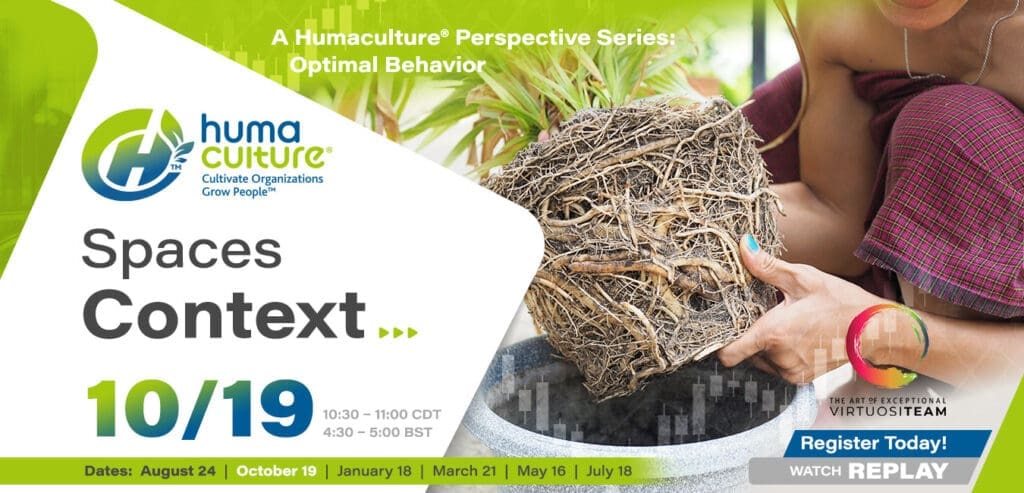
Spaces Context: “Grow a Willow in a Desert? The importance of Spaces”
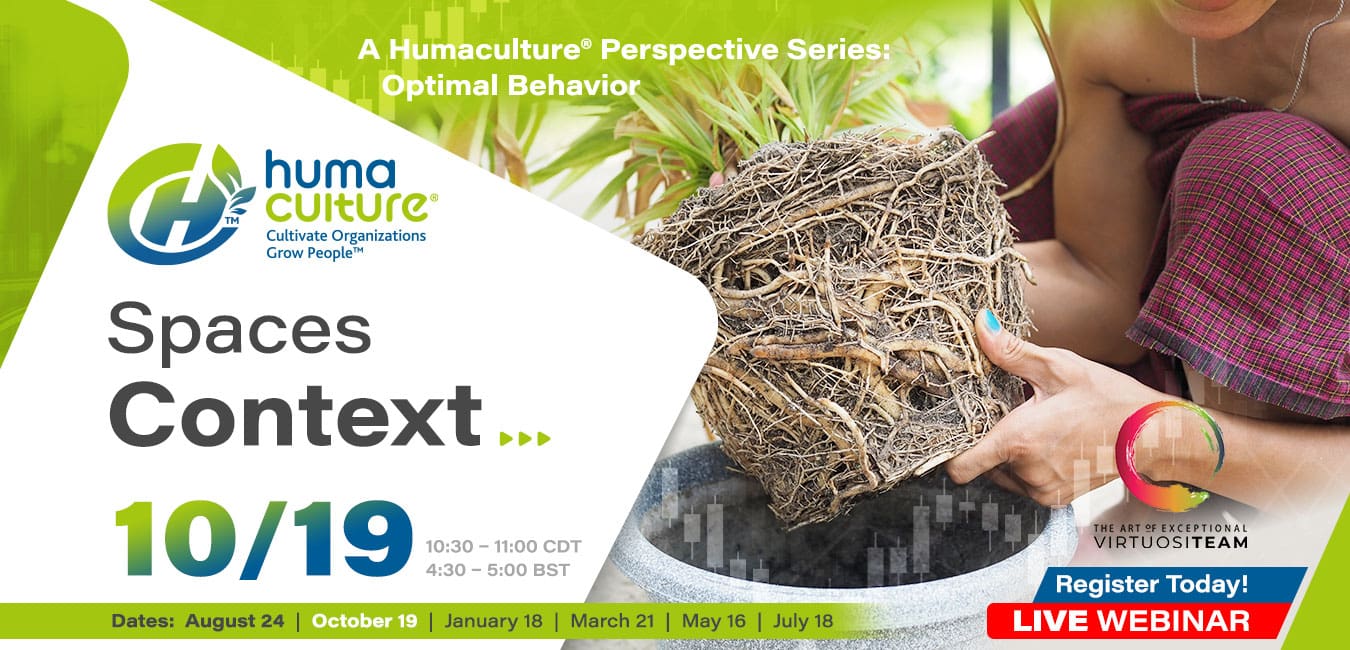
Join us on Thursday, October 19, from 10:30 to 11:00 CDT for the second webinar in Humaculture, Inc.’s “Optimal Behavior: Making Optimal Behavior the Natural Choice.” You will learn why spaces can hamper performance and well-being and how to design your spaces to lead to optimal behavior.
Presenters
- Steve Cyboran, ASA, MAAA, FCA, CEBS, actuary and strategy consultant
- Wes Rogers, Humaculturist® and strategy consultant
- Colin Bullen, ASA, behavior change actuary
- Hanlie van Wyk, behavior change consultant
Objective
In this second session in our series on optimal behavior, we explore how spaces influence behavior. The physical space in which you work can elicit mental and physical reactions that impact positively on performance, mental wellbeing and physical health. Today, physical configuration of buildings reflects a bias toward human energy conservation—and against physical activity, thereby contributing to sedentary behavior which has been linked to nearly all costly lifestyle diseases. In addition, the World Health Organization (WHO) estimates that 30% of new or remodeled office buildings show signs of Sick Building Syndrome (SBS) and that between 10% and 30% of the occupants of these buildings are affected by SBS, e.g. lethargy.
Research further indicates that your physical space can have a positive effect of up to 22% on a range of performance indicators, such as improved concentration, focus, collaboration, learning and cognitive control (working memory, inhibition, and cognitive flexibility). Furthermore, loyalty to an organization is increasingly determined by social and place attachment.
“We shape our buildings, and afterwards, our buildings shape us.” –Winston Churchill
Shaping Spaces to Promote Optimal Behavior Key Takeaways
Join us to learn:
- Why spaces do not support well-being and may lead to sickness
- Why spaces hamper performance
- Why spaces are built counter to tasks
- How effective spaces can be designed to:
- Support healthy behavior and choices
- Improve innovation and performance
- Support efficient task completion
Available Support
We are available to support you in your strategy, design, compliance, financial, and monitoring needs. Our team includes business and human relations leaders, finance experts, actuaries, clinicians, behavioral health experts, pharmacy experts, and legal resources to guide you through the strategy and compliance process. Please contact us: [email protected].
Webinar Replay: Creating the Conditions for Optimal Behavior
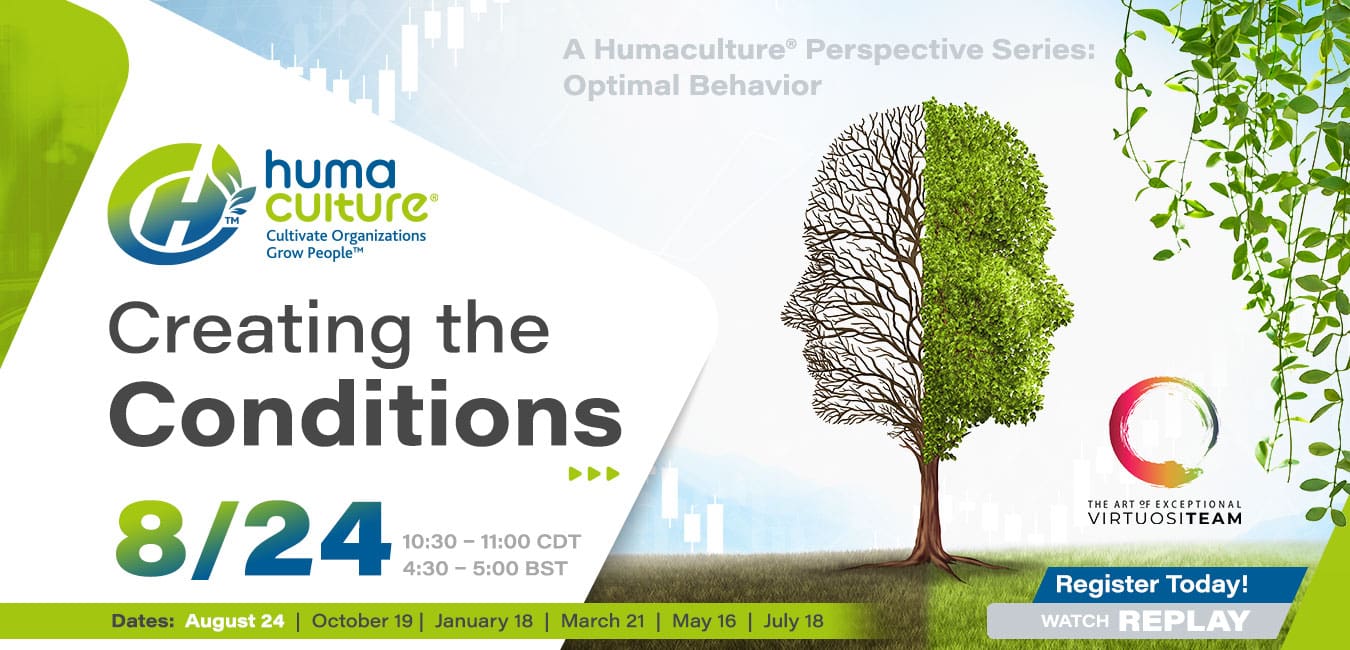
Watch a replay of the first webinar in Humaculture, Inc.’s “Optimal Behavior: Making Optimal Behavior the Natural Choice” to learn why organizations don’t effectively execute change and be introduced to some of the concepts that facilitate optimal behaviors to support a high-performing culture.
Presenters
- Steve Cyboran, ASA, MAAA, FCA, CEBS, actuary and strategy consultant
- Wes Rogers, Humaculturist® and strategy consultant
- Colin Bullen, ASA, behavior change actuary
- Hanlie van Wyk, behavior change consultant
Objective
This is the introductory webinar in our new series on optimal behavior. We explore why people have difficulty in achieving and sustaining change, the difference between short term changes in behavior and long term change through habits, what it takes to achieve optimal behavior in a population, and how to use influence to create a high-performing culture.
Creating the Conditions for Optimal Behavior Key Takeaways
During this session, participants will learn that:
- Why people find it hard to behave optimally
- Why people behave inconsistently
- Why organizations fail to execute change effectively
- How effective organizations:
- Set the contexts to influence behavior
- Understand the powers that influence behavior
- Use influence to create a high-performing culture
Available Support
We are available to support you in your strategy, design, compliance, financial, and monitoring needs. Our team includes business and human relations leaders, finance experts, actuaries, clinicians, behavioral health experts, pharmacy experts, and legal resources to guide you through the strategy and compliance process. Please contact us: [email protected].
Watch
Watch the Career Planning: Effective Pruning Bears Fruit: Manager Development Webinar Replay via Rumble or YouTube.
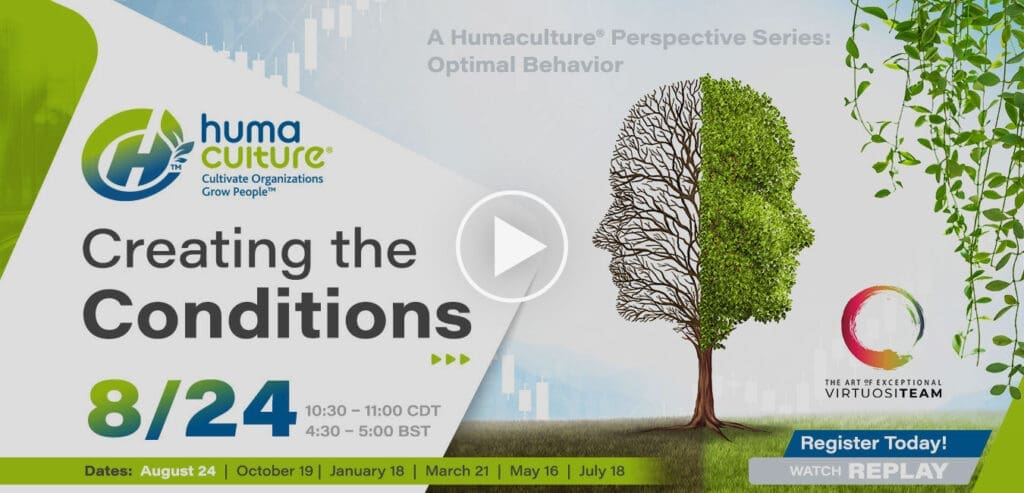
Introduction: Creating the Conditions for Optimal Behavior
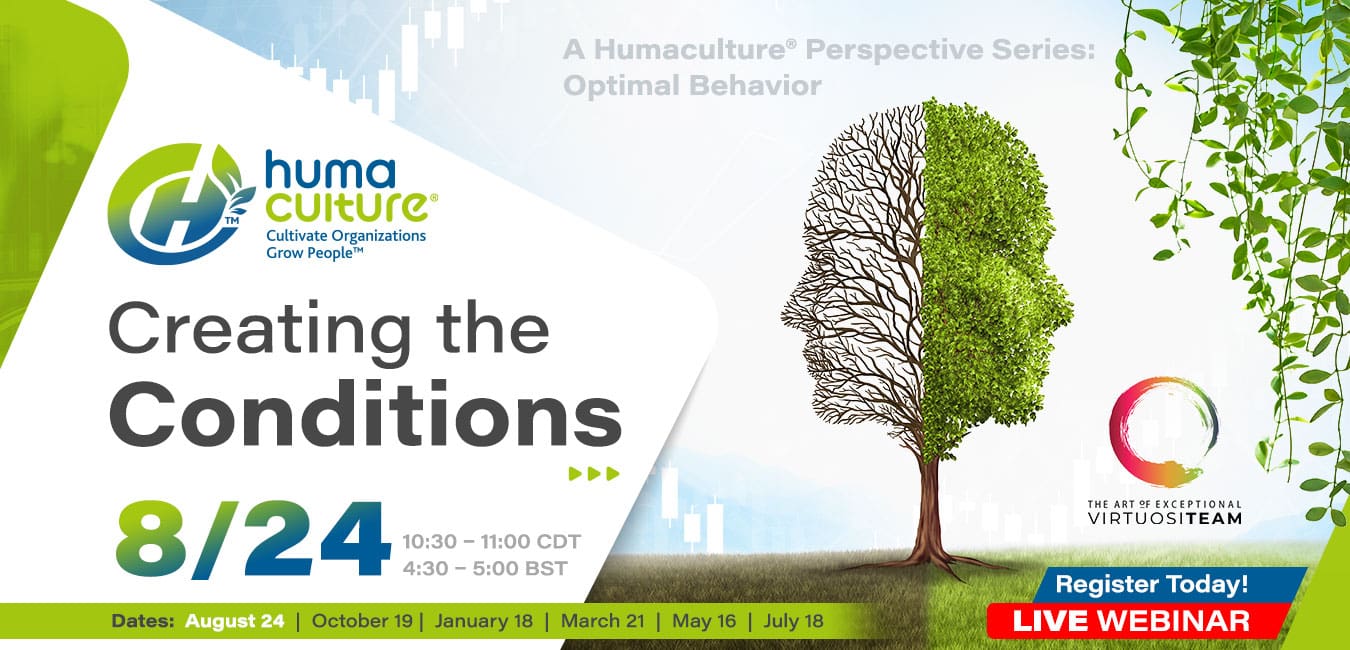
Join us on Thursday, August 24, from 10:30 to 11:00 CDT for the first webinar in Humaculture, Inc.’s “Optimal Behavior: Making Optimal Behavior the Natural Choice.” You will learn why organizations don’t effectively execute change and be introduced to some of the concepts that facilitate optimal behaviors to support a high-performing culture.
Presenters
- Steve Cyboran, ASA, MAAA, FCA, CEBS, actuary and strategy consultant
- Wes Rogers, Humaculturist® and strategy consultant
- Colin Bullen, ASA, behavior change actuary
- Hanlie van Wyk, behavior change consultant
Objective
This is the introductory webinar in our new series on optimal behavior. We will explore why people have difficulty in achieving and sustaining change, the difference between short term changes in behavior and long term change though habits, what it takes to achieve optimal behavior in a population, and how to use influence to create a high-performing culture.
Creating the Conditions for Optimal Behavior Key Takeaways
During this session, participants will learn that:
- Why people find it hard to behave optimally
- Why people behave inconsistently
- Why organizations fail to execute change effectively
- How effective organizations:
- Set the contexts to influence behavior
- Understand the powers that influence behavior
- Use influence to create a high-performing culture
Optimal Behavior: Making Optimal Behavior the Natural Choice
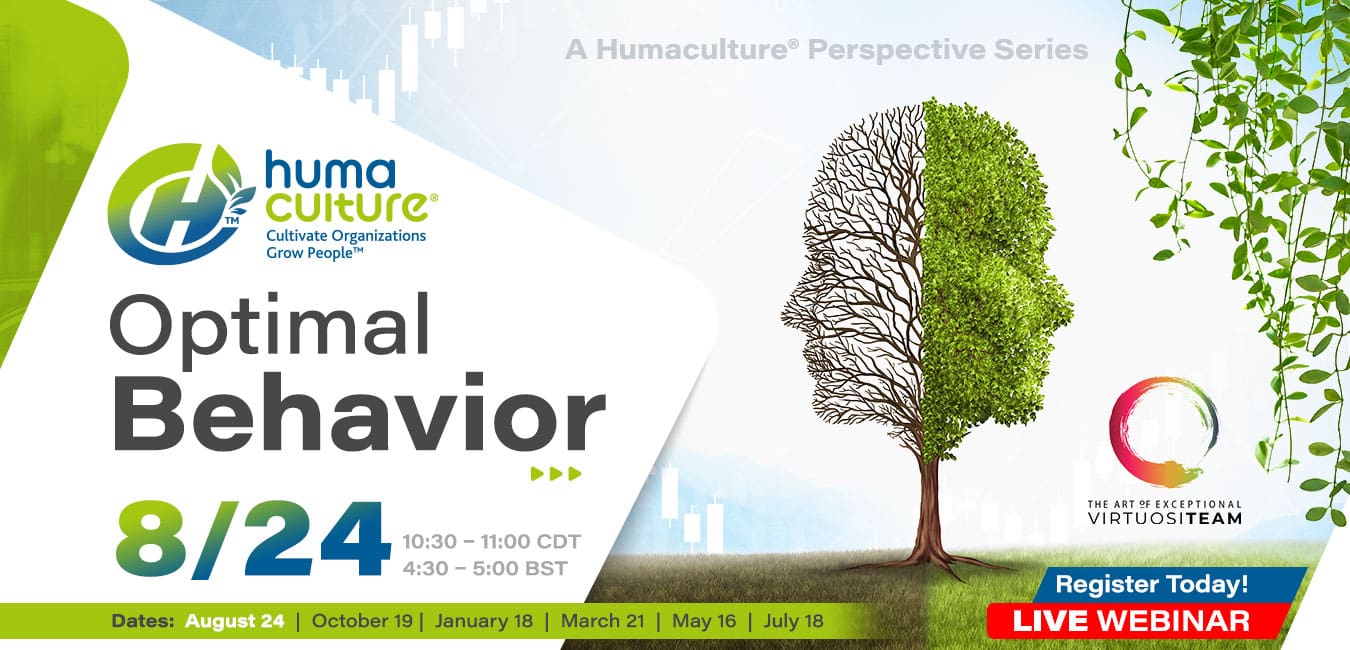
Please join Humaculture, Inc. and Virtuositeam for our Humaculture® Perspective Series on Optimal Behavior. This series will focus on how to create the conditions to Make Optimal Behavior the Natural Choice.
Overview
In this webinar series, we explore ways organizations can incorporate research-based, practical approaches to nurture and support optimal behaviors. Optimal behaviors are those that are the most beneficial to the individual as well as the organization.
Horticulturists consider the impact of the conditions in which plants are grown (e.g., climate, soil structure, space and fertility, arrangement, companion planting). Growth and productivity improve when the context of each dimension is appropriately addressed, and the responses of each plant to these conditions are clearly understood and applied. Expertise from fields like botany and soil sciences provide the successful horticulturist with the information to do their jobs well.
Similarly, Humaculturists consider the Seven Dimensions of Humaculture® to employ knowledge solidly “rooted” in science for the best results. Behavioral Research Applied Technology Laboratory (BRATLAB), Virtuositeam’s research arm, set out to answer some crucial questions related to understanding changes in behavior and habit creation:
- Which habits really matter, and to what degree, to the three biggest hidden drivers of sustained performance at work, human health, happiness, and security?
- How do we support people to practice these habits in a way that they experience as easy and natural, and that leaves them feeling highly engaged with their employer?
Four Powers Model of Change
The result: the Four Powers Model of Change. This model helps organizations create a thriving culture by leveraging this key distinction: how people THINK they behave and make decisions, versus how they ACTUALLY behave and make decisions. Four Powers is based on behavioral theories and validated research from a variety of leading thinkers, behavioral research laboratories, and BRATLAB’s own extensive field testing. BRATLAB looked across industries to find the influence techniques that have been successfully used to shape employee and customer behavior for years.
The topics for the upcoming series will include:
| August 24, 2023 – 10:30-11:00 CDT | Introduction: “Creating the Conditions for Optimal Behavior” |
| October 19, 2023 – 10:30-11:00 CDT | Spaces Context: “Grow a Willow in a Desert? The importance of Spaces” |
| January 18, 2023 – 10:30-11:00 CDT | Context of the Self: “The Complexity of Each Person” |
| March 21, 2024 – 10:30-11:00 CDT | Systems Context: “The Systems that Govern Behavior” |
| May 16, 2024 – 10:30-11:00 CDT | Social Context: “How People Influence Each Other” |
| July 18, 2024 – 10:30-11:00 CDT | Harvest Time: “Reaping the Fruit of Optimal Behaviors” |
Prior Series
- Hidden Opportunities, A Strategic Compliance Series
- People Development: A Humaculture® Perspective Series
Available Support
We are available to support you in your strategy, design, compliance, financial, and monitoring needs. Our team includes experts in organization design, actuarial science, clinical, and legal can guide the process to achieve optimal behavior. Please contact us.
Webinar Replay: Effective Pruning Bears Fruit: Leadership Development
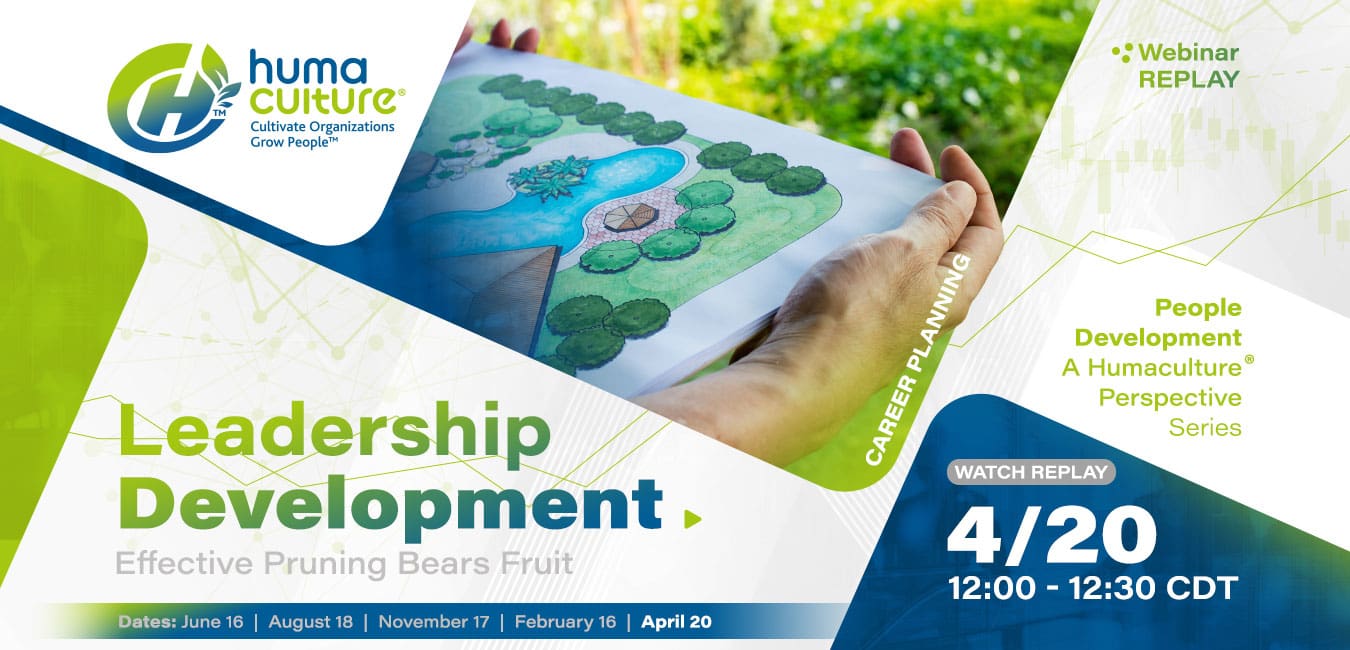
Watch a replay of the fifth webinar in Humaculture, Inc.’s “People Development: A Humaculture® Perspective Series” to learn how to conduct Career Planning to support leadership development, and why “Effective Pruning Bears Fruit” by building leadership capabilities.
Presenters
- Steve Cyboran, ASA, MAAA, FCA, CEBS, actuary and strategy consultant
- Wes Rogers, Humaculturist® and strategy consultant
- Christi Green, RN, MS, PHR, strategy and people consultant
Objective
We’ve talked about how to develop managers to lead to growth and new directions as opposed to staying rooted in the current problems. Now this webinar focuses on how to develop leaders to advance strategy, focus on people, and inspire performance. This results in leadership cultivating the organizational “soil” which leads to real, practical changes that advance the business.
Career Planning: Leadership Development Key Takeaways
During this session, participants will learn that:
- Leaders fail to make decisions
- Leadership vacuums create confusion and a toxic environment
- Leaders who lack a broad perspective undermine operations
- For effective leadership development organizations must:
- Understand effective leadership qualities
- Build and cultivate the right organizational “soil”
- Develop leaders who have good intuition and decision-making skills
- Ensure well-rounded leadership team with appropriate autonomy
- Nurture and develop for intended purposes
Available Support
We are available to support you in your strategy, design, compliance, financial, and monitoring needs. Our team includes business and human relations leaders, finance experts, actuaries, clinicians, behavioral health experts, pharmacy experts, and legal resources to guide you through the strategy and compliance process. Please contact us: [email protected].
Watch
Watch the Career Planning: Effective Pruning Bears Fruit: Manager Development Webinar Replay via Rumble or YouTube.
Webinar Replay: Effective Pruning Bears Fruit: Manager Development
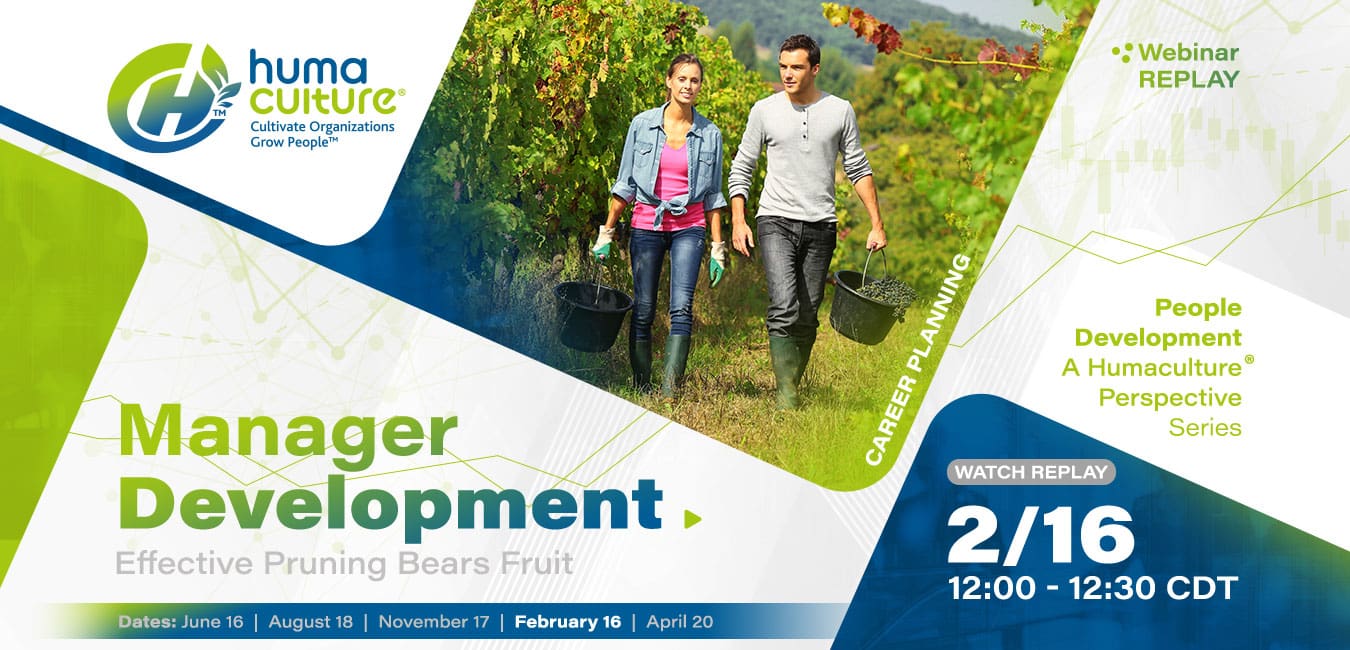
Watch a replay of the fourth webinar in Humaculture, Inc.’s “People Development: A Humaculture® Perspective Series” to learn how to conduct Career Planning to support manager development, and why “Effective Pruning Bears Fruit” by building manager capabilities.
Presenters
- Steve Cyboran, ASA, MAAA, FCA, CEBS, actuary and strategy consultant
- Wes Rogers, Humaculturist® and strategy consultant
- Christi Green, RN, MS, PHR, strategy and people consultant
Objective
We’ve talked about how to “Effectively Prune” to activate and inspire our workplace AND workforce to further grow and develop employees. Now this webinar focuses on how to develop managers to facilitate growth instead of control, to focus on people in addition to results, and to be vision driven instead of a problem solver. This leads to growth and new directions as opposed to staying rooted in the current problems.
Career Planning: Manager Development Key Takeaways
During this session, participants will learn that:
- Organizations fall into the “star” employee syndrome
- Organizations don’t think from a people development perspective
- Culture of Control creates a toxic environment
- For effective manager development organizations must:
- Promote intentionally to fulfill vision, mission, values
- Effectively identify manager qualities/potential
- Develop and deploy learning and growth opportunities
- Shift from Culture of Control to Culture of Growth
- Prepare for appropriate transitions
Available Support
We are available to support you in your strategy, design, compliance, financial, and monitoring needs. Our team includes business and human relations leaders, finance experts, actuaries, clinicians, behavioral health experts, pharmacy experts, and legal resources to guide you through the strategy and compliance process. Please contact us: [email protected].
Watch
Watch the Career Planning: Effective Pruning Bears Fruit: Manager Development Webinar Replay via Rumble or YouTube.
Webinar Replay: Effective Pruning Bears Fruit: Employee Development
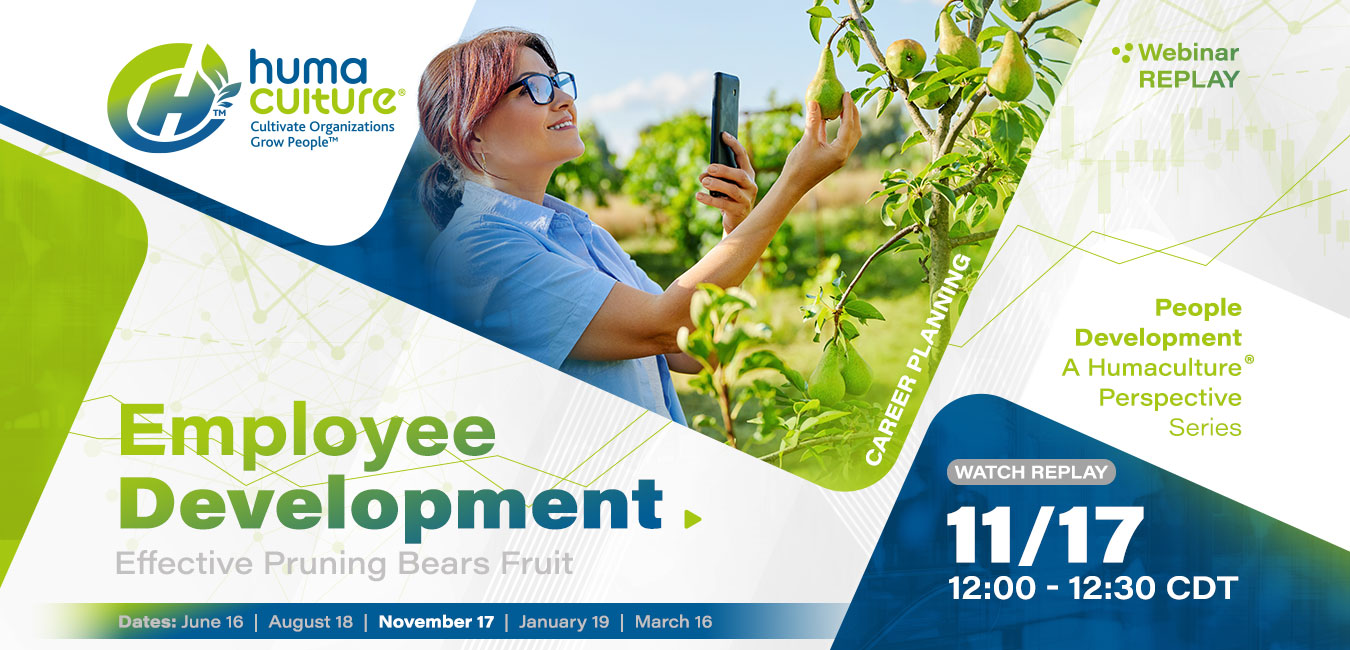
Watch a replay of the third webinar in Humaculture, Inc.’s “People Development: A Humaculture® Perspective Series” to learn how to conduct Career Planning to support employee development, and why “Effective Pruning Bears Fruit” by building employee capabilities.
Presenters
- Steve Cyboran, ASA, MAAA, FCA, CEBS, actuary and strategy consultant
- Wes Rogers, Humaculturist® and strategy consultant
- Christi Green, RN, MS, PHR, strategy and people consultant
Employee Development Objective
We’ve talked about how to “Walk the Garden” to assess employees as well as help them develop capabilities to align with the organization’s vision, mission, and values. Now this webinar focuses on how to activate and inspire our workplace AND workforce to further grow and develop employees. Research is abundantly clear that engaged employees help organizations succeed and bear fruit. There is no silver bullet to increase retention/reduce turnover. However, we do believe that investing in the organizational soil and the culture to nurture and support people will bear the fruits of success!
Career Planning: Employee Development Key Takeaways
During this session, participants will learn that:
- Organizations sometimes fall into the “warm body syndrome” trap
- Unhealthy/misaligned cultures disrupt employee development efforts
- Career planning tends to only occur only for a select few
- For effective employee development organizations must:
- Hire and develop intentionally to fulfill the vision, mission, values
- “Prune” to focus growth as well as direct energy and effort
- “Trellis and irrigate” to support desired growth
- Prepare for appropriate transitions
Available Support
We are available to support you in your strategy, design, compliance, financial, and monitoring needs. Our team includes business and human relations leaders, finance experts, actuaries, clinicians, behavioral health experts, pharmacy experts, and legal resources to guide you through the strategy and compliance process. Please contact us: [email protected].
Watch
Watch the Career Planning: Effective Pruning Bears Fruit: Employee Development Webinar Replay below, or via Rumble or YouTube.
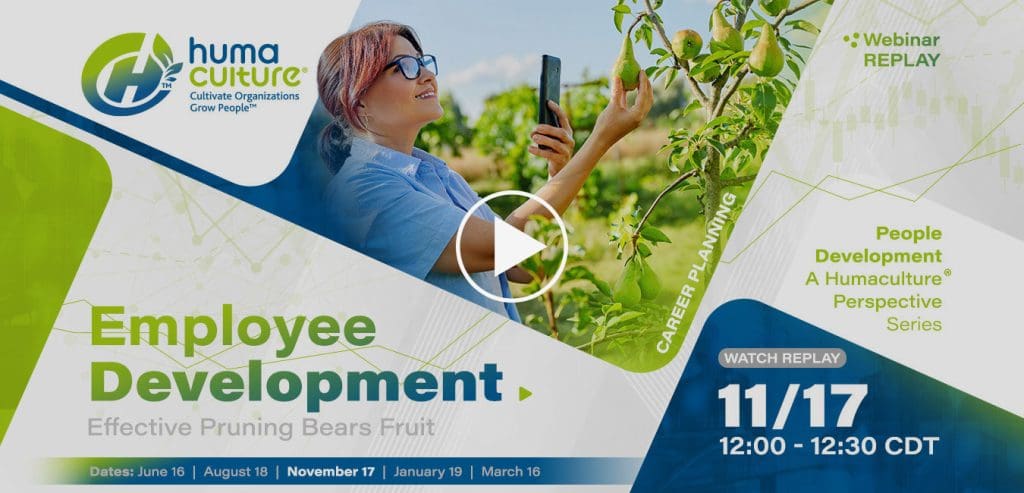
Webinar Replay: Pruning the Vines – Capabilities: Prune to Encourage Growth
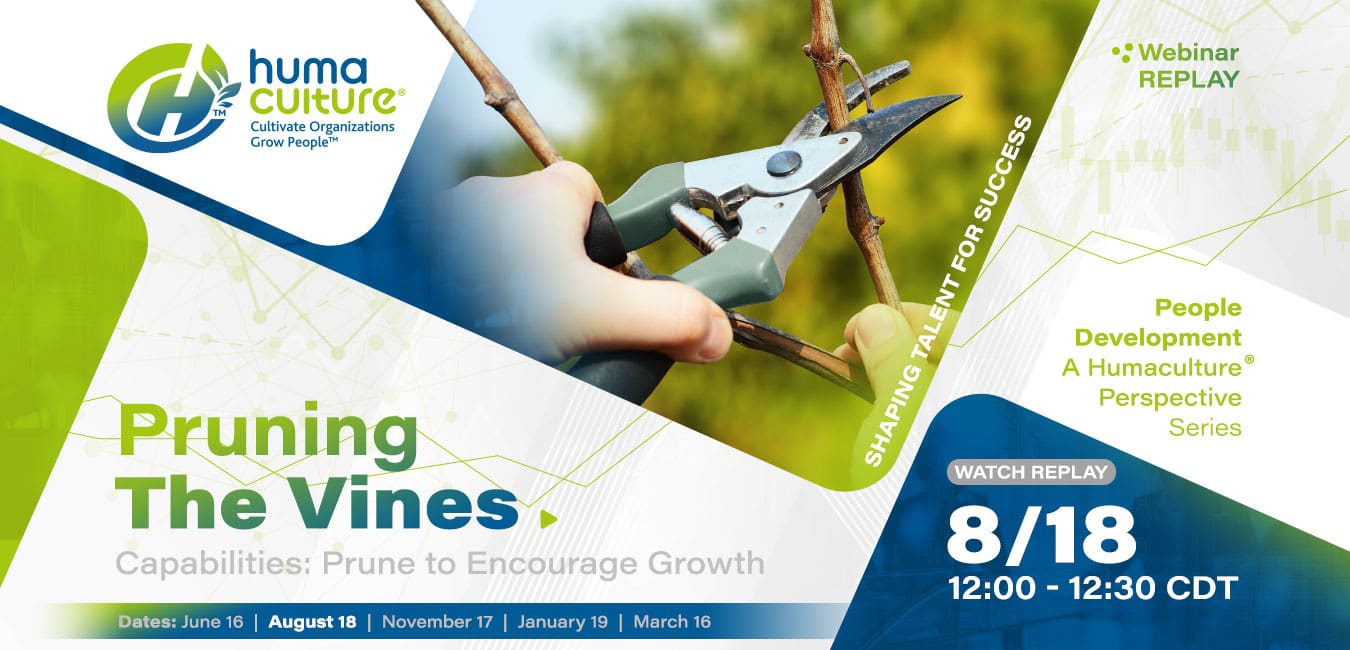
Watch a replay of the second webinar in Humaculture, Inc.’s “People Development: A Humaculture® Perspective Series”, to learn how to shape talent for success by “Pruning the Vines,” using capabilities to prune to encourage growth so employees to fulfill their potential and maximize alignment and productivity.
Presenters
- Steve Cyboran, ASA, MAAA, FCA, CEBS, actuary and strategy consultant
- Wes Rogers, Humaculturist® and strategy consultant
- Christi Green, RN, MS, PHR, strategy and people consultant
Prune to Encourage Growth Objective
This webinar explores ways organizations can “Prune to Encourage Growth” to shape talent for the future. Capabilities can be used to help organizations select the best plants, determine how best to organize them in the garden, identify strengths and weaknesses, prune away distractions (weak branches) to encourage growth and fruit production.
Key Takeaways
During this session, participants will learn that:
- Competencies tend to be just a checklist of skills to manage
- People that focus on everything may not be very good at anything
- Highly skilled employees may not thrive in management or leadership
- Effective people development:
- Is rooted in a clear understanding of organizational vision
- Facilitates growth, supports optimal organizational (garden) design
- Assesses skills and needs to support strategic priorities
- Explores the employee’s interests, abilities, and desires
- Identifies potential for transitions, management, or leadership
- Applies principles that work
Available Support
We are available to support you in your strategy, design, compliance, financial, and monitoring needs. Our team includes business and human relations leaders, finance experts, actuaries, clinicians, behavioral health experts, pharmacy experts, and legal resources to guide you through the strategy and compliance process. Please contact us: [email protected].
Watch
Watch the Shaping Talent for Success: Pruning the Vines – Capabilities: Prune to Encourage Growth Webinar Replay below, or via Rumble or YouTube.
